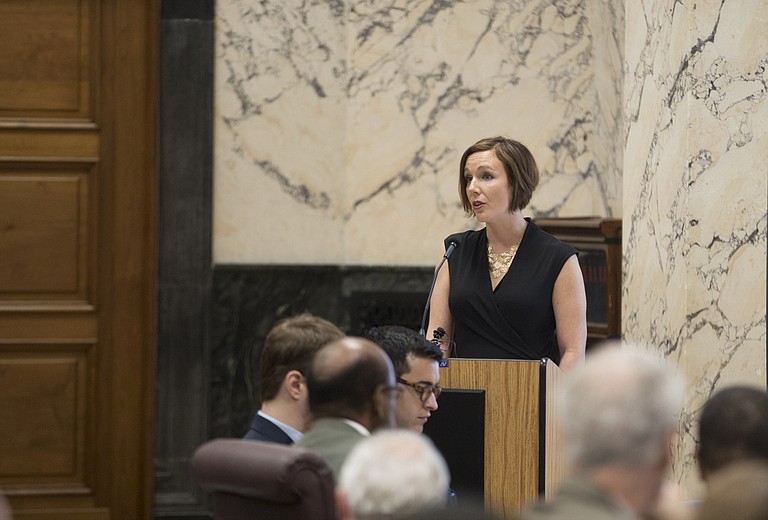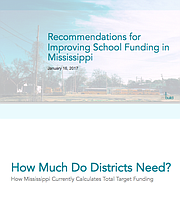EdBuild CEO Rebecca Sibilia presented recommendations to lawmakers on Jan. 16. Photo by Imani Khayyam.
Wednesday, January 25, 2017
JACKSON — Mississippi isn't EdBuild's first state rodeo. Back in early 2015, EdBuild met with officials in Georgia Gov. Nathan Deal's office, who campaigned for re-election on the idea of re-evaluating school funding in his state. Deal created a commission to work on the new formula made up of lawmakers, superintendents, teachers and community advocates, to come up with a report of recommendations to the Legislature.
EdBuild worked primarily with the officials in Deal's office, and eventually the funding sub-committee on the commission, until the New Jersey nonprofit's contract was up. The commission continued its work through 2015, and released a report that December.
Georgia should move to a student-based funding formula, the report recommended, including weights for students based on their grade level, technical and agricultural educations, students with disabilities, gifted students, English language learners and economically disadvantage d students. The report also recommended that Georgia increase funding for its formula by $258 million as well as add more funds when available.
Lawmakers there put off the report as the state went through a contentious referendum on a proposed state takeover district in 2016, which ultimately failed.
Risk to Low-Income Students
Claire Suggs, a policy analyst at the Georgia Budget and Policy Institute, has had plenty of time to run numbers on the commission's proposals in the meantime and found that the definition used in the report for economically disadvantaged students would significantly decrease funding to the state's many low-income students.
Georgia schools, like Mississippi's, get funding for low-income students through the free and reduced lunch program or the federal community eligibility provision. That enables schools or districts with 40 percent of low-income students who qualify for free meals directly (like those certified through SNAP) to receive extra federal funding that applies to the whole district or school—potentially including students in the district who aren't eligible for free and reduced lunch.
Critics of the provision say it allots too much money to schools that serve students who do not come from low-income families. To fix this, Georgia lawmakers have suggested changing the definition of a low-income student to "direct certification," meaning only students who are eligible for SNAP or TANF benefits, kids in foster care and homeless children would be eligible for the low-income weight of the formula.
In Georgia, Suggs said, this is problematic because the state's SNAP program is set low at 130 percent above the poverty line, and if a family of three makes $9,600 annually, they don't qualify for TANF.
"Recognizing that 'no, we don't want to misidentify kids that don't have financial needs,' there's that legitimate concern," Suggs said. "But now we're really looking at under-estimating, and this is something that's not unique to Georgia or Mississippi, so we tried to figure out how other states are grappling with this."
One Georgia school district's chief financial officer told the Athens Banner-Herald that his district, which has levied the maximum amount of local ad-valorem taxes, would see a slight increase in funding based on the commission's report. Another superintendent who hadn't run the numbers yet told the Banner-Herald that he suspects Suggs' analysis of the new "low-income" definition was correct.
Georgia lawmakers have not made any decisions, yet, so they still have time to see if they can find a way to capture more low-income students. In Mississippi, lawmakers have taken the different approach.
Mississippi has no commission looking at the Mississippi Adequate Education Program or evaluating the weighted student formula proposals EdBuild rolled out last week. In fact, the EdBuild recommendations came on the deadline day to file legislation in the 2017 session.
Lawmakers in both the House and the Senate have dropped boilerplate bills that they could use to make changes to the formula this session. Sibilia warned lawmakers last week that they should phase in any changes they make to the formula, so as to not do harm to students. She told the Jackson Free Press that she hopes the new formula comes up for discussion and debate in the Legislature this year.
"We do hope there will be significant debate and movement this year because there's been a lot of conversation (about formula changes)," Sibilia said in a Jan. 23 interview.
EdBuild also worked with Connecticut on weighted student funding, but neither Georgia nor Connecticut has moved on the proposals. Sibilia said she expects this to change in 2017. In Mississippi, not all lawmakers are on board with the idea of ramming a formula change through the statehouse, and several Democrats feel left out of the process, which up until this point has been kept largely behind closed doors.
Contentious Political Decisions
The day after Sibilia presented her nonprofit's findings to lawmakers, Sen. Hob Bryan, D-Amory, one of the authors of MAEP, held a public hearing, which other Democrats from both the House and the Senate attended, to discuss weighted student funding and their concerns with the process going forward.
One of Bryan's chief concerns is the dollar amount, or lack thereof, in EdBuild's presentation. Unlike the Georgia commission's report, which called out a specific dollar amount of increased funding needed to switch the formula over to a student-focused one, EdBuild's report leaves all monetary values out of its recommendations. Sibilia said the dollar amount is up to lawmakers, and told the Jackson Free Press that figures used in the 80-page report are "examples only," not base figures for legislators to use.
Sen. Bryan asks what the point of a new formula is if no new money goes into it. Lawmakers at the Jan. 17 hearing and superintendents have told the Jackson Free Press that most districts' current MAEP funds go entirely or almost entirely to teacher salaries. Bryan wants to know how this formula would change that.
"[H]ow on earth is changing the dollar amounts the districts get in any way, shape, form or fashion going to have anything to do with getting more dollars to the classroom?" Sen. Bryan said at the hearing.
As a concept, weighted student funding aims for equity, focusing on funding the highest student needs. Dr. Eric Hanushek, the Paul and Jean Hanna Senior Fellow at Stanford University, analyzes the economics of educational issues. Weighted student funding, Hanushek says is a sensible idea, especially since the goal in most cases is to put money towards school districts that have disadvantaged kids or those that need special education. Weights, however, are the political part of the process, he says.
"The debate is always about what are the weights, how much are the weights, and there's basically no guidance," Hanushek told the Jackson Free Press. "It's political decisions—individual states vary widely on how much they fund for (kids in) poverty ... so that's a political decision that can be very contentious."
Once the weights are determined, it's important, Hanushek said, to ensure that districts have flexibility to spend their money where they need to, as long as there's an accountability system in place. EdBuild has suggested this kind of flexibility for school districts in how they spend their money as well as a separate "fiscal transparency system" that will require districts to report in granular detail what exactly they are spending all of their funding on.
"The reason we have it (the transparency system) in there is that's the way you consistently re-evaluate whether or not the values are sufficient in the formula," Sibilia told the Jackson Free Press.
Essentially, without increased funding, a weighted student formula would shift dollars around, based on whatever weights lawmakers choose. So some districts might lose some of their state funding, forcing local taxpayers to foot the bill to keep their schools going through ad-valorem taxes, Bryan said.
"If we're going to have a weighted formula and more money for this group ... or that group, if the total dollar amount of this formula is less than the total dollar amount of the existing law, then you don't got no additional money for these items," Bryan said. "The total dollar amount has got to go up unless you're up to something."
EdBuild's recommendations could lessen the state's burden for funding its public schools, which Bryan says was a purposeful choice in 1997 when MAEP was formed.
"One of the things we wanted to do ... was help take the pressure off the ad-valorem taxpayers. One of the reasons we had the cap and the 28-mill contribution (rule) is ... protection for ad-valorem taxpayers so that taxes on their farms, homes and cars did not go up, so the state would fund more of the education funding formula and not raise the sales tax," Sen. Bryan said.
EdBuild recommends that the state eliminate its "27% rule," which "prescribes that no local district will pay for more than 27% of the minimum calculated cost of public education," the EdBuild report says. Mississippi supports its public schools at a higher percentage than most states, and that rule forces the state to make up for funding dollars in local districts that cannot afford to leverage enough ad valorem (property tax) on their communities to pull their full weight. EdBuild's recommendations keep the State on the hook for funding up to 28 mills like in MAEP, but the need to go the extra mile would be eliminated if the Legislature heeds EdBuild's recommendations.
EdBuild's School-Choice Roots
So far, the formula revamp has been anything but transparent—for Democratic lawmakers at least. At the Jan. 17 hearing, no Democratic lawmakers reported that they had been invited to any EdBuild meetings, unless representatives from EdBuild were visiting a school in their district.
"The notion that the existing formula is not transparent but that presentation the other day was transparent or that this new formula would be transparent is another example of the bizarre misuse of the term 'transparent,'" Bryan said. "I tell you George Orwell on LSD would blush at the way they're using the word transparent."
Funding for EdBuild's $250,000 contract with the Mississippi Legislature has also faced criticism after pressure from multiple media outlets finally forced lawmakers to release the contract, revealing that the Legislature only paid $125,000, while private funding from unnamed EdBuild donors covered the rest of the study's costs.
These donors represent private interests in education funding and policy groups from across the political spectrum. EdBuild receives funding from several foundations, like the Walton Family Foundation (Walmart founders), the Bill and Melinda Gates Foundation (Microsoft founders) and partners with groups like the CityBridge Foundation, which invests in public or charter schools in Washington, D.C..
EdBuild is in its infancy as a company (it started in 2014), and Sibilia came from an education-policy background, first working in the Washington, D.C., education department and then moving to the nonprofit Students First, run by Michelle Rhee. The former chancellor of Washington, D.C., public schools, Rhee was a controversial figure, after firing over 200 teachers in D.C., mainly due to poor performance, she said then.
The move caused a massive resistance from teacher unions, leading to her resignation later that year. Rhee then started Students First, an education-reform lobbying group that donated hefty amounts of money to school-board elections as well as Democratic and Republican lawmakers, Slate reported. The nonprofit dedicated its policy efforts to school choice, a movement that is strong in Mississippi with backing from the lieutenant governor and the governor himself.
Sibilia left in 2014 to start EdBuild, and Students First dissolved into 50CAN, a similar education advocacy group, The Los Angeles Times reported.
A Path to More Charters?
Weighted student funding is not just a popular idea among conservative political groups. One of the largest liberal think tanks in Washington, D.C., the Center for American Progress, is also listed as one of EdBuild's donors. The center along with several other organizations co-signed onto a 2006 study promoting weighted student funding. The Fordham Institute, which defines its mission as "promot(ing) educational excellence for every child in America via quality research, analysis, and commentary, as well as advocacy and charter school authorizing in Ohio," produced the report.
Parts of that report show that weighted student funding integrates well with charter-school expansion.
"In a fully developed WSF system—with public school choice and a genuine labor market for teachers—both districts and schools could be more flexible, efficient, and effective. There are two specific types of choice options that need to be considered: charters and other alternatives that are part of districts, and public schools of choice that are independent of districts," the 2006 report says.
"If a charter school (or other school option) operates as part of a district, the solution is simple: it should get the same weighted student amount as other district schools. The district should withhold for oversight and accountability the same amount from these schools as from all other district schools, and money for all services should be provided to these schools."
Rod Paige, former secretary of education in the U.S. known for his support of vouchers and for implementing the controversial "No Child Left Behind" law, was one of the co-signers on the 2006 report. The IHL Board of Trustees appointed him as the current interim president of Jackson State University last fall.
Conservative groups like Jeb Bush's Foundation for Excellence in Education and the libertarian think tank, the Reason Foundation, are proponents of weighted student funding because of their easy transition into school choice. Sibilia said that groups from both ends of the political spectrum agree on weighted student funding.
"It provides for flexibility and accountability; it's an easy way to distribute; it's not an overly partisan proposal, and what I think folks did is jump to conclusions, frankly, because it's my background," Sibilia told the Jackson Free Press.
"What I would say just to be succinct about this is (weighted student funding) enables both choice funding and traditional school funding. There would be no difference, or no change in terms of how the funding would be handled at the state level, but what's really important is that the funding stream in and of itself does not expand school choice or vouchers—that's a separate decision that's made by the Legislature."
It is no secret that Mississippi leaders are interested in expanding school choice. Ahead of Senate confirmation hearings, Gov. Phil Bryant and Lt. Gov. Tate Reeves both sent letters in support of the controversial nominee for secretary of education, Betsy DeVos, who has pushed for school-choice options for decades including charter schools and vouchers.
In Mississippi, Lt. Gov. Tate Reeves has pushed for public charter-school expansion in the state and attended the grand opening of ReImagine Prep in Jackson in 2015. The deadline for bills to come out of committee is Jan. 31, so lawmakers are under the gun to work through EdBuild's recommendations if they plan to make any changes this legislative session. As this story went to press, Lt. Gov. Tate Reeves spoke at the school choice rally at the Capitol on Tuesday, Jan. 24.
What lawmakers choose to prioritize in terms of weights—and how that will affect school districts and the students they serve—remains to be seen.
Correction: A previous version of this story said that Gov. Phil Bryant appointed Rod Paige as interim president of Jackson State. The IHL Board of Trustees appointed Paige, not Bryant. We apologize for this error. This story has also been updated to reflect that the school choice rally was happening at the Capitol as we went to press. This story has been updated to reflect that it's the Walton Family Foundation, not the Walton Foundation. Email state reporter Arielle Dreher at [email protected].




Comments
Use the comment form below to begin a discussion about this content.
Sign in to comment
Or login with:
OpenID